
mcp
Catalog of official Microsoft MCP (Model Context Protocol) server implementations for AI-powered data access and tool integration
Stars: 2560
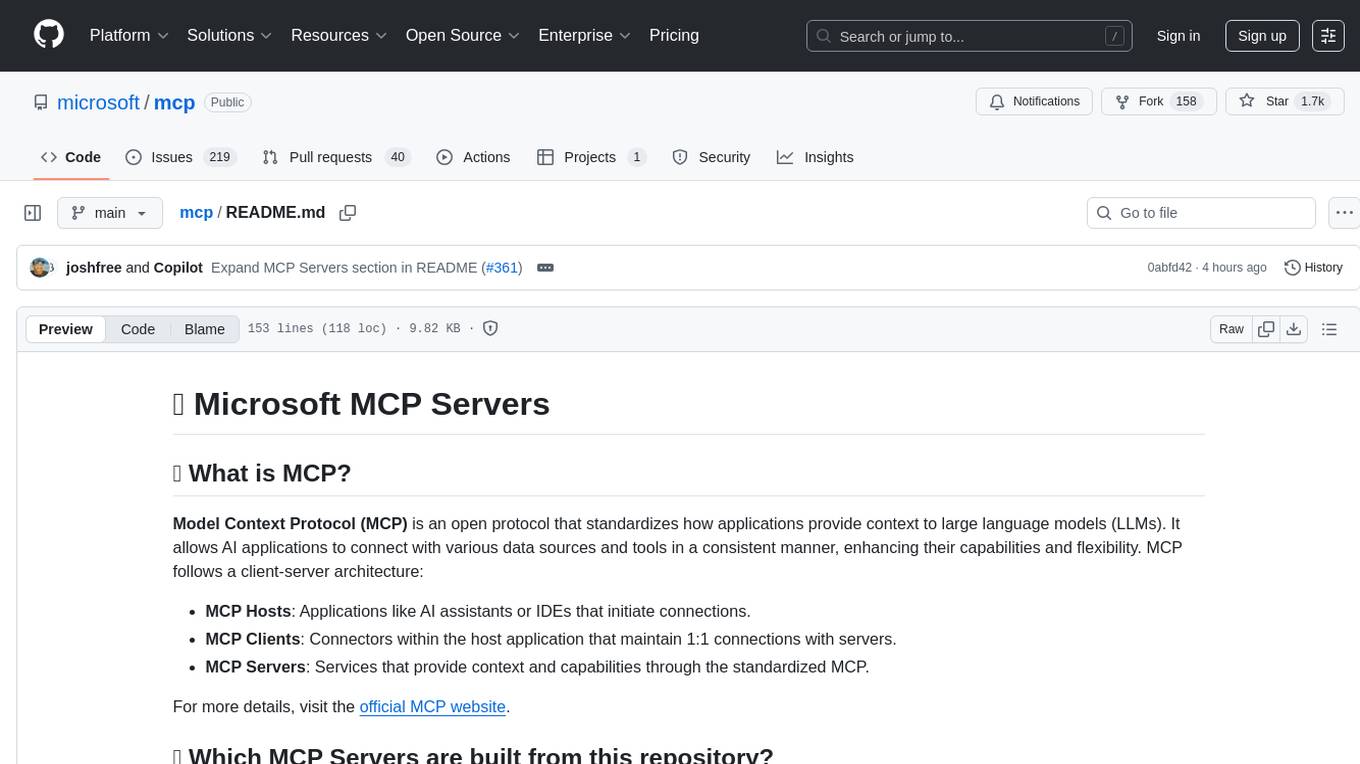
Model Context Protocol (MCP) is an open protocol that standardizes how applications provide context to large language models (LLMs). It allows AI applications to connect with various data sources and tools in a consistent manner, enhancing their capabilities and flexibility. This repository contains core libraries, test frameworks, engineering systems, pipelines, and tooling for Microsoft MCP Server contributors to unify engineering investments and reduce duplication and divergence. For more details, visit the official MCP website.
README:
Model Context Protocol (MCP) is an open protocol that standardizes how applications provide context to large language models (LLMs). It allows AI applications to connect with various data sources and tools in a consistent manner, enhancing their capabilities and flexibility. MCP follows a client-server architecture:
- MCP Hosts: Applications like AI assistants or IDEs that initiate connections.
- MCP Clients: Connectors within the host application that maintain 1:1 connections with servers.
- MCP Servers: Services that provide context and capabilities through the standardized MCP.
For more details, visit the official MCP website.
This repository contains core libraries, test frameworks, engineering systems, pipelines, and tooling for Microsoft MCP Server contributors to unify engineering investments; and reduce duplication and divergence:
| MCP Server | README | Source Code | CHANGELOG | Releases | Documentation | Troubleshooting | Support |
|---|---|---|---|---|---|---|---|
| Azure MCP | Azure MCP README | Azure MCP Source Code | Azure MCP CHANGELOG | Azure MCP Releases | Azure MCP Documentation | Azure MCP Troubleshooting | Azure MCP Support |
| Microsoft Fabric MCP | Fabric MCP README | Fabric MCP Source Code | Fabric MCP CHANGELOG | Fabric MCP Releases | Fabric Documentation | Fabric MCP Troubleshooting | Fabric MCP Support |
- REPOSITORY: microsoft/mcp
- DESCRIPTION: All Azure MCP tools in a single server. The Azure MCP Server implements the MCP specification to create a seamless connection between AI agents and Azure services. Azure MCP Server can be used alone or with the GitHub Copilot for Azure extension in VS Code.
-
CATEGORY:
CLOUD AND INFRASTRUCTURE -
TYPE:
Local -
INSTALL:
- DOCUMENTATION: Get started with Foundry MCP Server
- DESCRIPTION: A Model Context Protocol server for Microsoft Foundry, providing a unified set of tools for models, knowledge, evaluation, and more.
-
CATEGORY:
CLOUD AND INFRASTRUCTURE -
TYPE:
REMOTE-https://mcp.ai.azure.com -
INSTALL:
- REPOSITORY: Azure DevOps MCP Server
- DESCRIPTION: This TypeScript project provides a local MCP server for Azure DevOps, enabling you to perform a wide range of Azure DevOps tasks directly from your code editor.
-
CATEGORY:
DEVELOPER TOOLS -
TYPE:
Local -
INSTALL:
- REPOSITORY: Azure/aks-mcp
- DESCRIPTION: An MCP server that enables AI assistants to interact with Azure Kubernetes Service (AKS) clusters. It serves as a bridge between AI tools and AKS, translating natural language requests into AKS operations and returning the results in a format the AI tools can understand.
-
CATEGORY:
CLOUD AND INFRASTRUCTURE -
TYPE:
Local -
INSTALL:
- REPOSITORY: github/github-mcp-server
- DESCRIPTION: Access GitHub repositories, issues, and pull requests through secure API integration.
-
CATEGORY:
DEVELOPER TOOLS -
TYPE:
REMOTE-https://api.githubcopilot.com/mcp -
INSTALL:
- REPOSITORY: github/awesome-copilot
- DESCRIPTION: Community-contributed instructions, prompts, and configurations to help you make the most of GitHub Copilot.
-
CATEGORY:
DEVELOPER TOOLS -
TYPE:
Local -
INSTALL:
- REPOSITORY: microsoft/markitdown
- DESCRIPTION: A specialized MCP server for Markdown processing and manipulation. Enables AI models to read, write, and transform Markdown content with robust parsing and formatting capabilities.
-
CATEGORY:
DEVELOPER TOOLS -
TYPE:
Local -
INSTALL:
- REPOSITORY: OfficeDev/microsoft-365-agents-toolkit
- DESCRIPTION: The Microsoft 365 Agents Toolkit MCP Server is a Model Context Protocol (MCP) server that provides a seamless connection between AI agents and developers for building apps and agents for Microsoft 365 and Microsoft 365 Copilot.
-
CATEGORY:
DEVELOPER TOOLS -
TYPE:
Local -
INSTALL:
- REPOSITORY: microsoft/clarity-mcp-server
- DESCRIPTION: This is a Model Context Protocol (MCP) server for the Microsoft Clarity data export API. It allows you to fetch analytics data from Clarity using Claude for Desktop or other MCP-compatible clients.
-
CATEGORY:
DATA AND ANALYTICS -
TYPE:
Local - INSTALL: microsoft/clarity-mcp-server
- REPOSITORY: Microsoft Dataverse
- DESCRIPTION: Chat over your business data using NL - Discover tables, run queries, retrieve data, insert or update records, and execute custom prompts grounded in business knowledge and context.
-
CATEGORY:
DATA AND ANALYTICS -
TYPE:
Local - INSTALL: Microsoft Dataverse
- REPOSITORY: @microsoft/devbox-mcp
- DESCRIPTION: An MCP server for Microsoft Dev Box. Enables natural language interactions for developer-focused operations like managing Dev Boxes, configuring environments, and handling pools.
-
CATEGORY:
DEVELOPER TOOLS -
TYPE:
Local -
INSTALL:
- REPOSITORY: microsoft/mcp
- DESCRIPTION: A local-first MCP server providing AI agents with comprehensive access to Microsoft Fabric's public APIs, item definitions, and best practices. Enables AI-assisted development for all Fabric workloads without connecting to live environments.
-
CATEGORY:
DATA AND ANALYTICS -
TYPE:
Local - INSTALL: microsoft/mcp
- REPOSITORY: RTI MCP Server
- DESCRIPTION: This server enables AI agents to interact with Fabric RTI services by providing tools through the MCP interface, allowing for seamless data querying and analysis capabilities.
-
CATEGORY:
DATA AND ANALYTICS -
TYPE:
Local -
INSTALL:
- REPOSITORY: microsoftdocs/mcp
- DESCRIPTION: AI assistant with real-time access to official Microsoft documentation.
-
CATEGORY:
PRODUCTIVITY -
TYPE:
REMOTE-https://learn.microsoft.com/api/mcp -
INSTALL:
- DOCUMENTATION: Explore Microsoft Sentinel data lake with data exploration collection
- DESCRIPTION: The data exploration tool collection in the Microsoft Sentinel Model Context Protocol (MCP) server lets you search for relevant tables and retrieve data from Microsoft Sentinel's data lake using natural language. Learn more: aka.ms/mcp/data-exploration.
-
CATEGORY:
SECURITY -
TYPE:
REMOTE-https://sentinel.microsoft.com/mcp/data-exploration -
INSTALL:
- REPOSITORY: MSSQL MCP Server
- DESCRIPTION: Chat with your business data the new agentic way using natural language and AI. Connect to any SQL database—from ground (on-premises) to Azure cloud to Microsoft Fabric via a simple connection string. Discover and define table schemas, manage tables, and perform CRUD operations through conversational prompts.
-
CATEGORY:
DEVELOPER TOOLS -
TYPE:
Local - INSTALL: MSSQL MCP Server
- REPOSITORY: NuGet/Home
- DESCRIPTION: This is a Model Context Protocol (MCP) server for NuGet, enabling advanced tooling and automation scenarios for NuGet package management.
-
CATEGORY:
DEVELOPER TOOLS -
TYPE:
Local - INSTALL: Nuget MCP Server
- REPOSITORY: microsoft/playwright-mcp
- DESCRIPTION: This server enables LLMs to interact with web pages through structured accessibility snapshots, bypassing the need for screenshots or visually-tuned models.
-
CATEGORY:
DEVELOPER TOOLS -
TYPE:
Local -
INSTALL:
- REPOSITORY: microsoft/wassette
- DESCRIPTION: Wassette: A security-oriented runtime that runs WebAssembly Components via MCP.
-
CATEGORY:
DEVELOPER TOOLS -
TYPE:
Local - INSTALL: microsoft/wassette
Check out the Azure Developer CLI (azd) templates tagged with MCP.
This project welcomes contributions and suggestions. Most contributions require you to agree to a Contributor License Agreement (CLA) declaring that you have the right to, and actually do, grant us the rights to use your contribution. For details, visit https://cla.opensource.microsoft.com.
When you submit a pull request, a CLA bot will automatically determine whether you need to provide a CLA and decorate the PR appropriately (e.g., status check, comment). Simply follow the instructions provided by the bot. You will only need to do this once across all repos using our CLA.
This project has adopted the Microsoft Open Source Code of Conduct. For more information see the Code of Conduct FAQ or contact [email protected] with any additional questions or comments.
This project may contain trademarks or logos for projects, products, or services. Authorized use of Microsoft trademarks or logos is subject to and must follow Microsoft's Trademark & Brand Guidelines. Use of Microsoft trademarks or logos in modified versions of this project must not cause confusion or imply Microsoft sponsorship. Any use of third-party trademarks or logos are subject to those third-party's policies.
For Tasks:
Click tags to check more tools for each tasksFor Jobs:
Alternative AI tools for mcp
Similar Open Source Tools

mcp
Model Context Protocol (MCP) is an open protocol that standardizes how applications provide context to large language models (LLMs). It allows AI applications to connect with various data sources and tools in a consistent manner, enhancing their capabilities and flexibility. This repository contains core libraries, test frameworks, engineering systems, pipelines, and tooling for Microsoft MCP Server contributors to unify engineering investments and reduce duplication and divergence. For more details, visit the official MCP website.
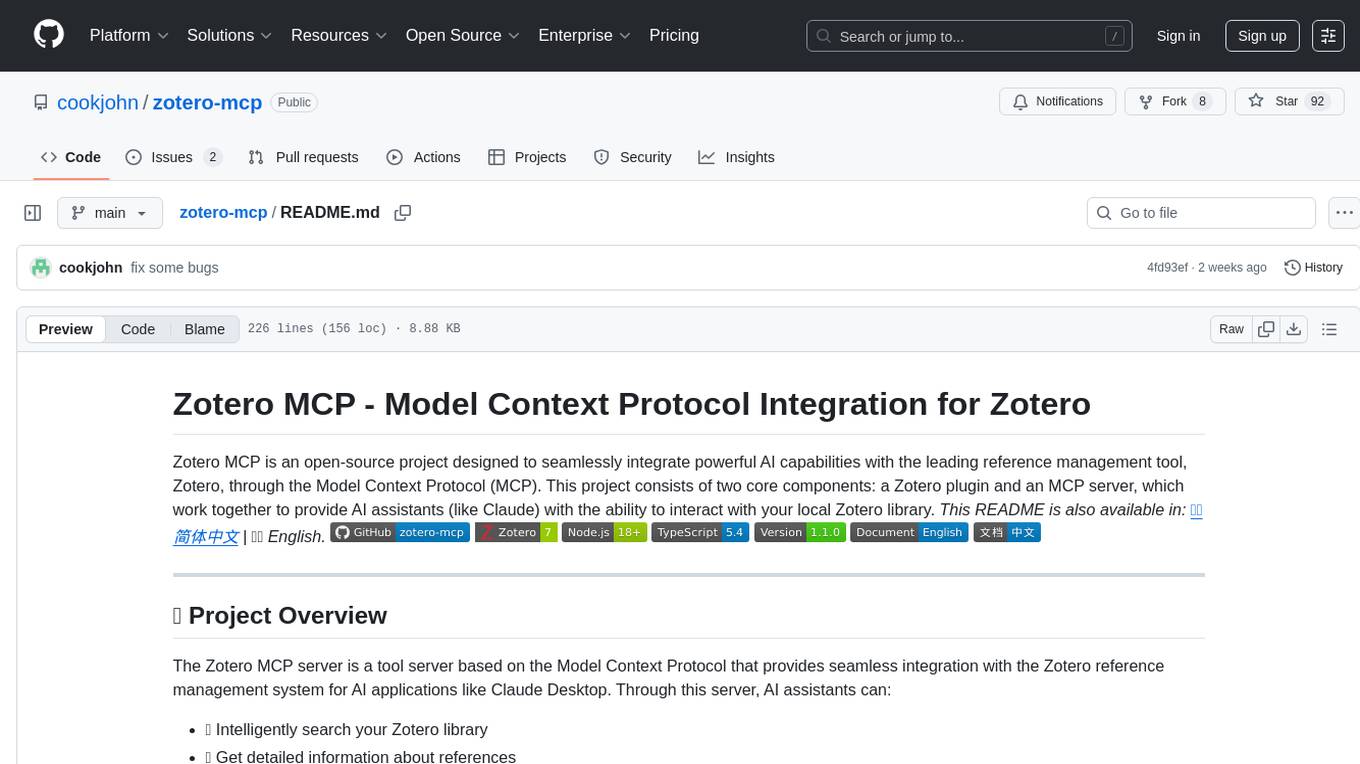
zotero-mcp
Zotero MCP is an open-source project that integrates AI capabilities with Zotero using the Model Context Protocol. It consists of a Zotero plugin and an MCP server, enabling AI assistants to search, retrieve, and cite references from Zotero library. The project features a unified architecture with an integrated MCP server, eliminating the need for a separate server process. It provides features like intelligent search, detailed reference information, filtering by tags and identifiers, aiding in academic tasks such as literature reviews and citation management.
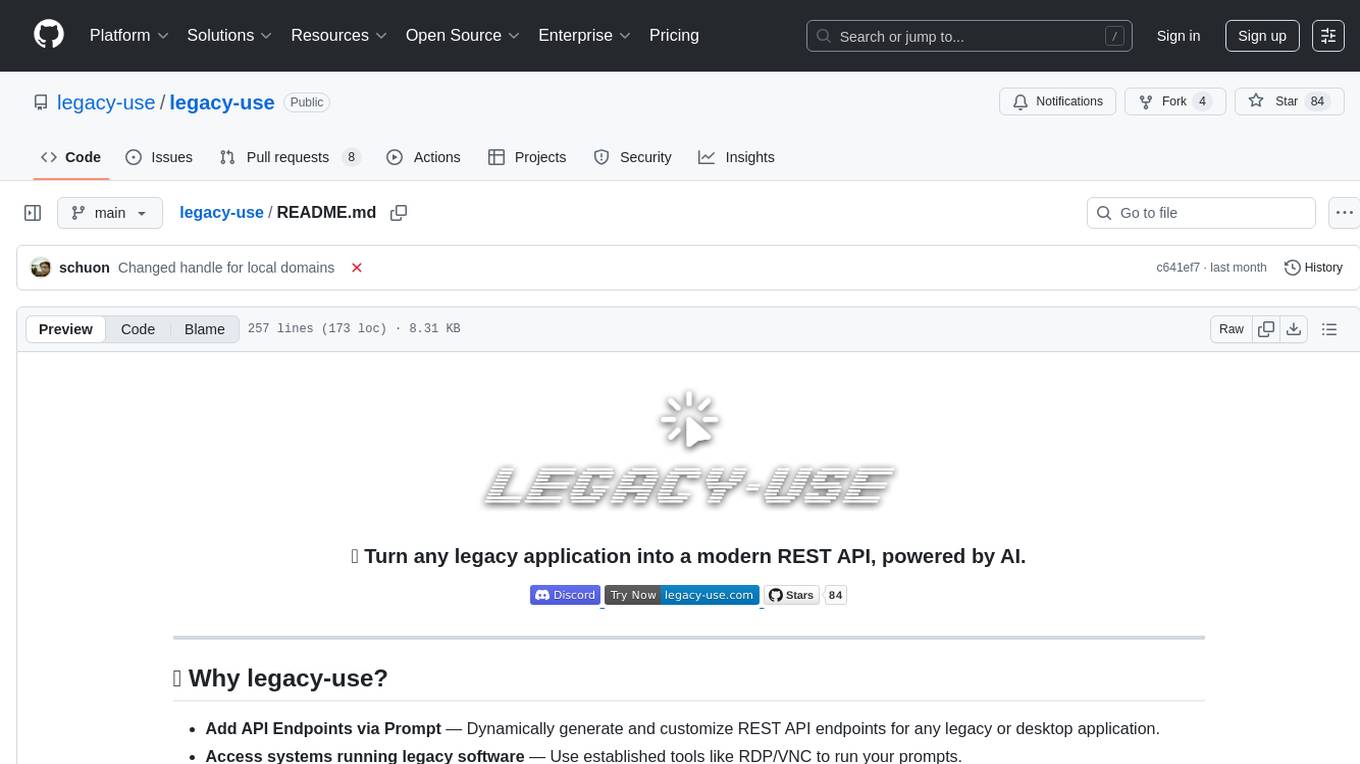
legacy-use
Legacy-use is a tool that transforms legacy applications into modern REST APIs using AI. It allows users to dynamically generate and customize API endpoints for legacy or desktop applications, access systems running legacy software, track and resolve issues with built-in observability tools, ensure secure and compliant automation, choose model providers independently, and deploy with enterprise-grade security and compliance. The tool provides a quick setup process, automatic API key generation, and supports Windows VM automation. It offers a user-friendly interface for adding targets, running jobs, and writing effective prompts. Legacy-use also supports various connectivity technologies like OpenVPN, Tailscale, WireGuard, VNC, RDP, and TeamViewer. Telemetry data is collected anonymously to improve the product, and users can opt-out of tracking. Optional configurations include enabling OpenVPN target creation and displaying backend endpoints documentation. Contributions to the project are welcome.
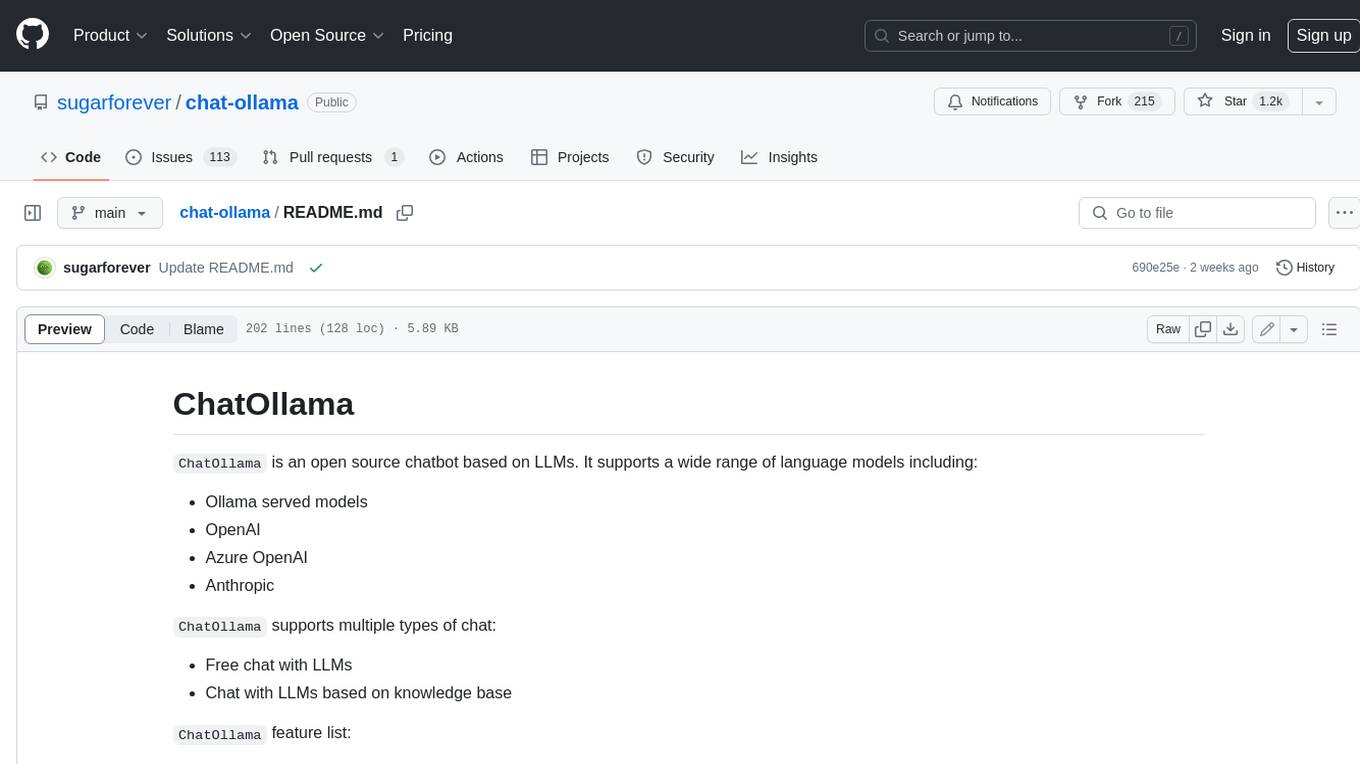
chat-ollama
ChatOllama is an open-source chatbot based on LLMs (Large Language Models). It supports a wide range of language models, including Ollama served models, OpenAI, Azure OpenAI, and Anthropic. ChatOllama supports multiple types of chat, including free chat with LLMs and chat with LLMs based on a knowledge base. Key features of ChatOllama include Ollama models management, knowledge bases management, chat, and commercial LLMs API keys management.
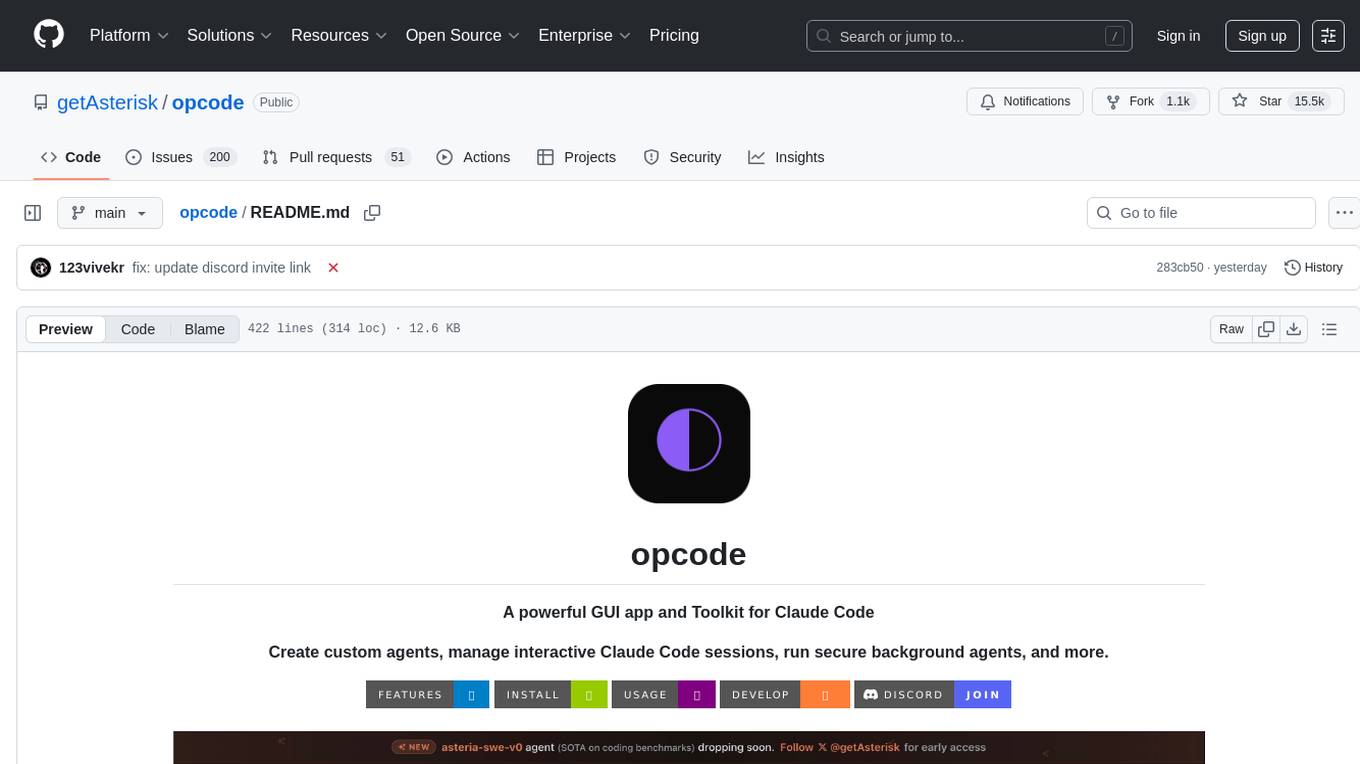
opcode
opcode is a powerful desktop application built with Tauri 2 that serves as a command center for interacting with Claude Code. It offers a visual GUI for managing Claude Code sessions, creating custom agents, tracking usage, and more. Users can navigate projects, create specialized AI agents, monitor usage analytics, manage MCP servers, create session checkpoints, edit CLAUDE.md files, and more. The tool bridges the gap between command-line tools and visual experiences, making AI-assisted development more intuitive and productive.
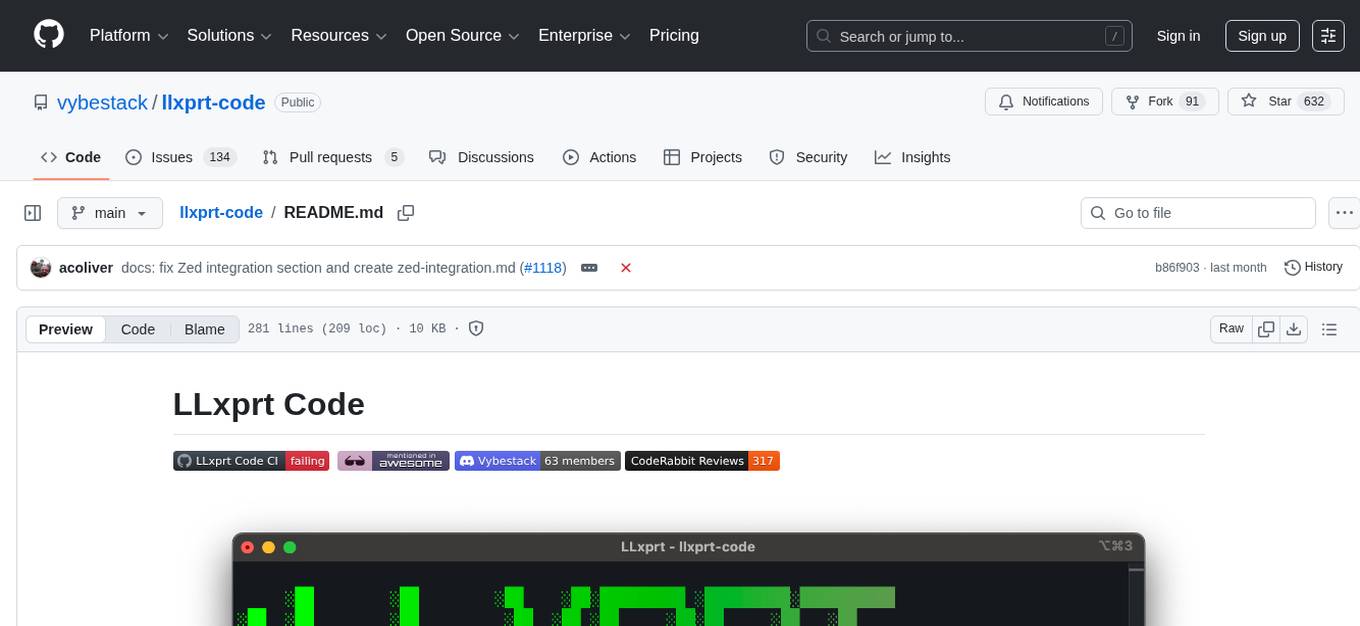
llxprt-code
LLxprt Code is an AI-powered coding assistant that works with any LLM provider, offering a command-line interface for querying and editing codebases, generating applications, and automating development workflows. It supports various subscriptions, provider flexibility, top open models, local model support, and a privacy-first approach. Users can interact with LLxprt Code in both interactive and non-interactive modes, leveraging features like subscription OAuth, multi-account failover, load balancer profiles, and extensive provider support. The tool also allows for the creation of advanced subagents for specialized tasks and integrates with the Zed editor for in-editor chat and code selection.
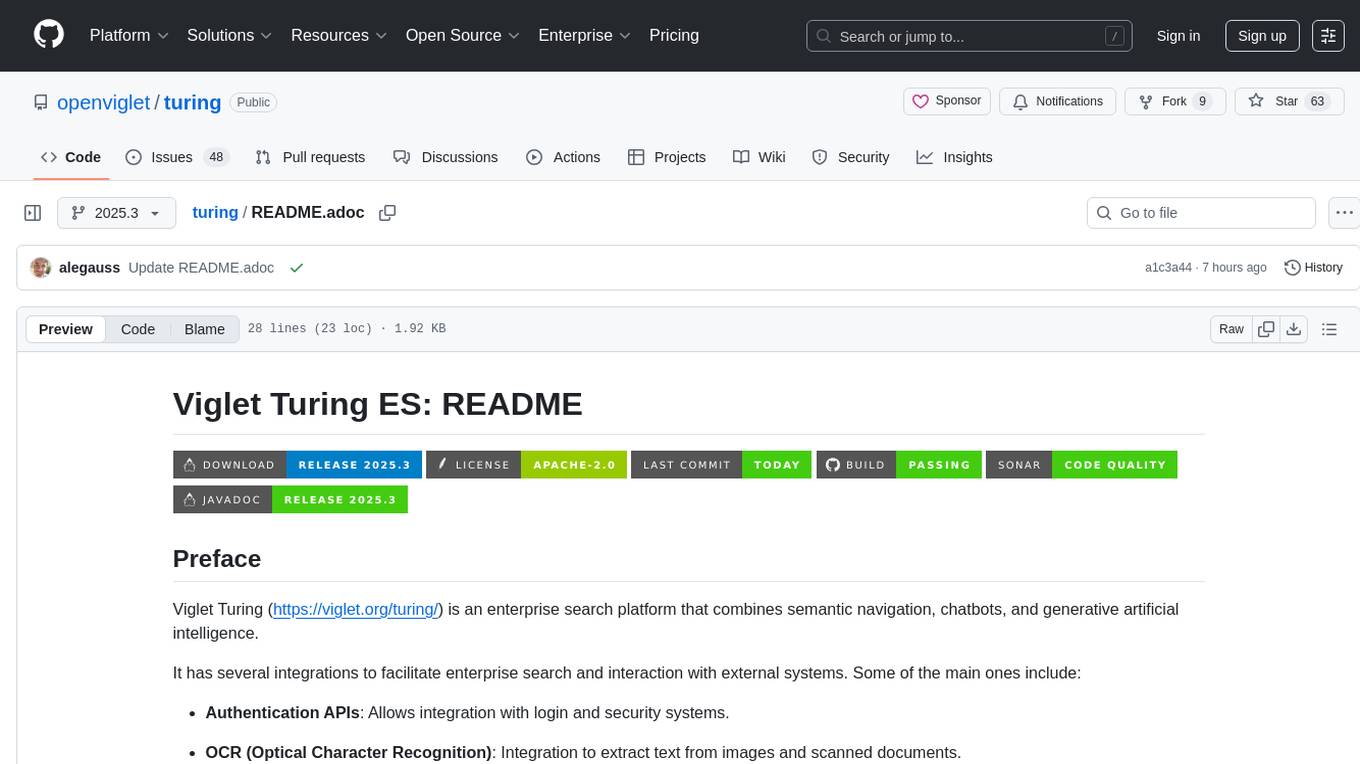
turing
Viglet Turing is an enterprise search platform that combines semantic navigation, chatbots, and generative artificial intelligence. It offers integrations for authentication APIs, OCR, content indexing, CMS connectors, web crawling, database connectors, and file system indexing.
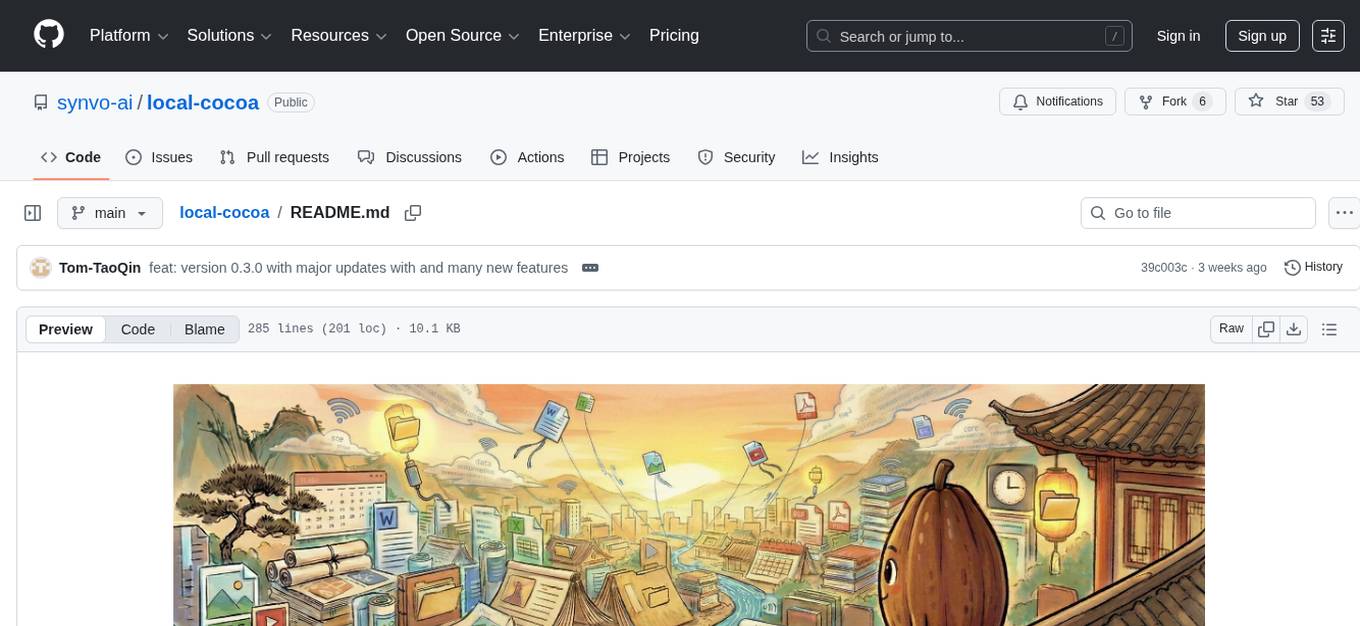
local-cocoa
Local Cocoa is a privacy-focused tool that runs entirely on your device, turning files into memory to spark insights and power actions. It offers features like fully local privacy, multimodal memory, vector-powered retrieval, intelligent indexing, vision understanding, hardware acceleration, focused user experience, integrated notes, and auto-sync. The tool combines file ingestion, intelligent chunking, and local retrieval to build a private on-device knowledge system. The ultimate goal includes more connectors like Google Drive integration, voice mode for local speech-to-text interaction, and a plugin ecosystem for community tools and agents. Local Cocoa is built using Electron, React, TypeScript, FastAPI, llama.cpp, and Qdrant.
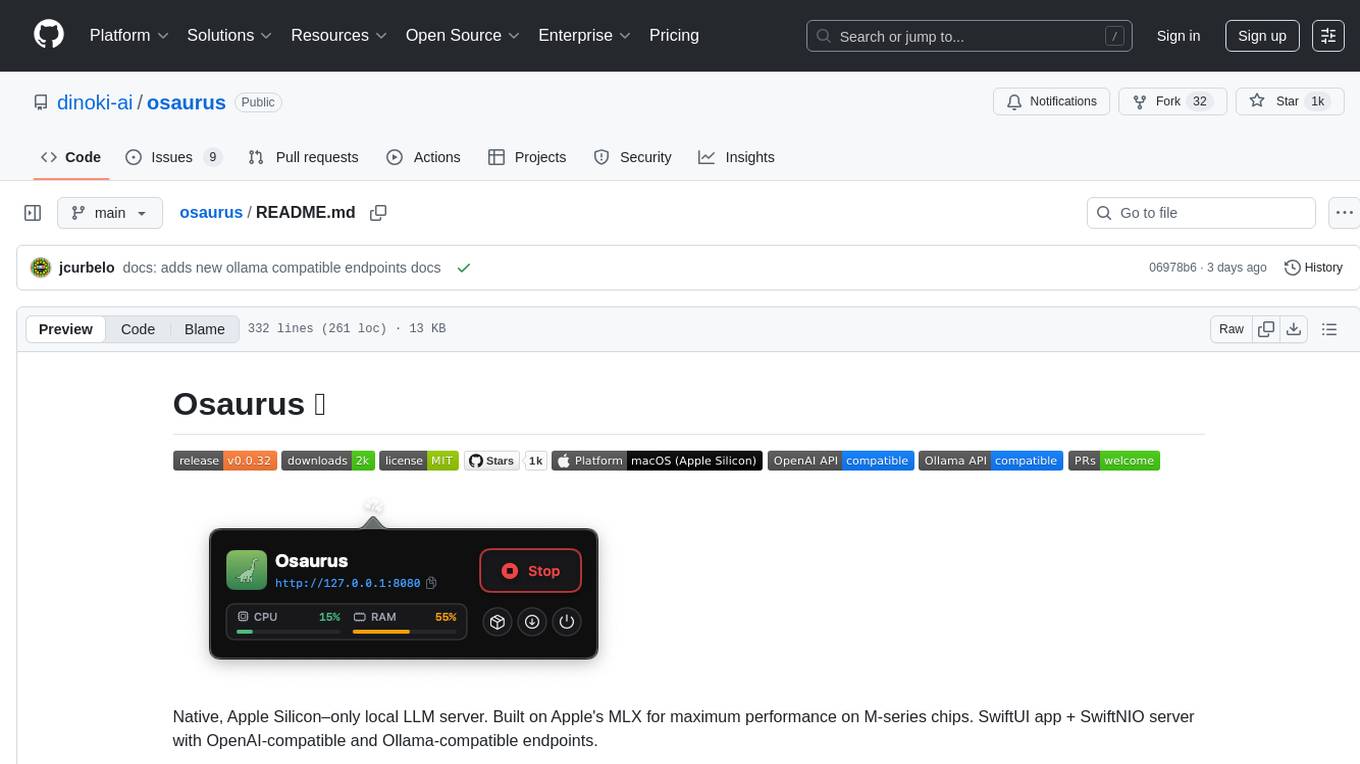
osaurus
Osaurus is a native, Apple Silicon-only local LLM server built on Apple's MLX for maximum performance on M‑series chips. It is a SwiftUI app + SwiftNIO server with OpenAI‑compatible and Ollama‑compatible endpoints. The tool supports native MLX text generation, model management, streaming and non‑streaming chat completions, OpenAI‑compatible function calling, real-time system resource monitoring, and path normalization for API compatibility. Osaurus is designed for macOS 15.5+ and Apple Silicon (M1 or newer) with Xcode 16.4+ required for building from source.
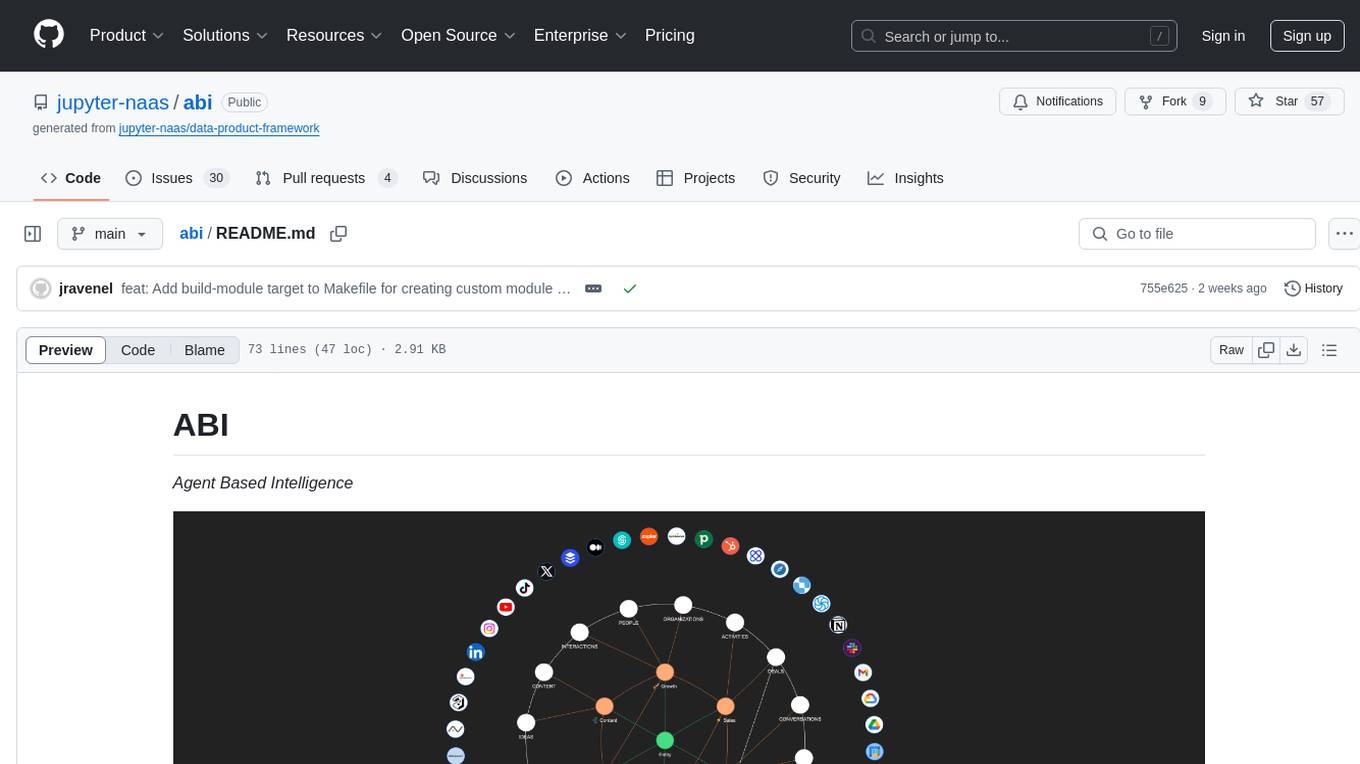
abi
ABI (Agentic Brain Infrastructure) is a Python-based AI Operating System designed to serve as the core infrastructure for building an Agentic AI Ontology Engine. It empowers organizations to integrate, manage, and scale AI-driven operations with multiple AI models, focusing on ontology, agent-driven workflows, and analytics. ABI emphasizes modularity and customization, providing a customizable framework aligned with international standards and regulatory frameworks. It offers features such as configurable AI agents, ontology management, integrations with external data sources, data processing pipelines, workflow automation, analytics, and data handling capabilities.
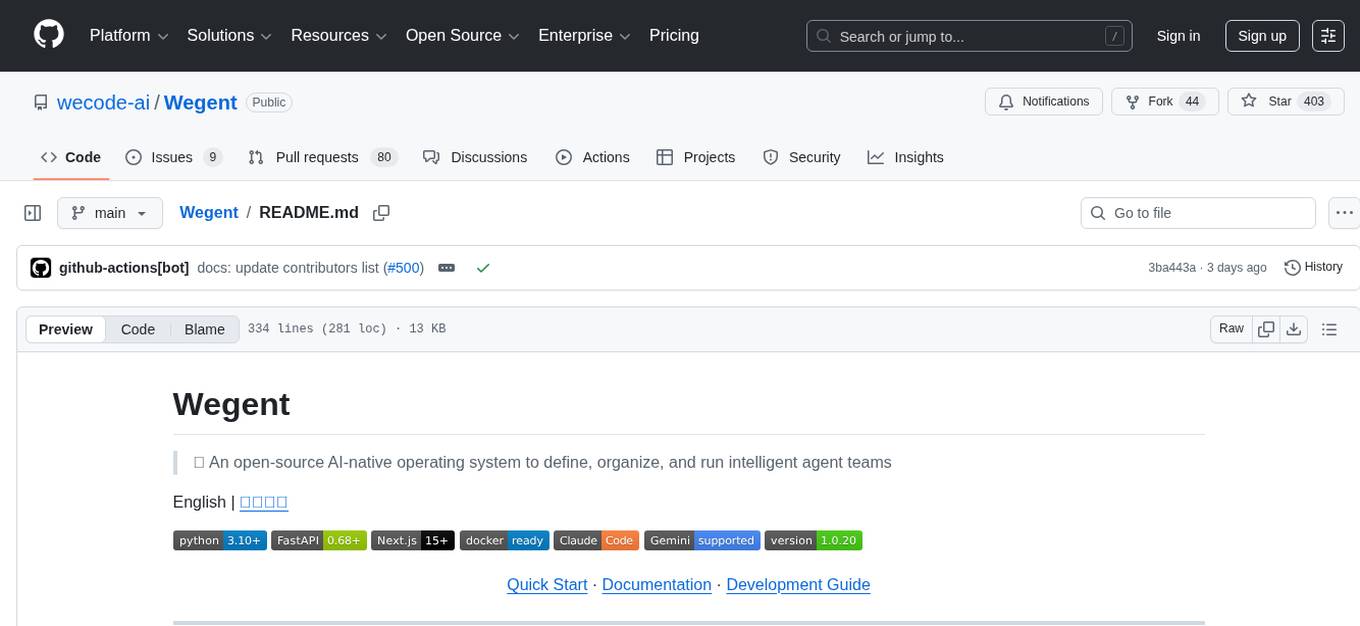
Wegent
Wegent is an open-source AI-native operating system designed to define, organize, and run intelligent agent teams. It offers various core features such as a chat agent with multi-model support, conversation history, group chat, attachment parsing, follow-up mode, error correction mode, long-term memory, sandbox execution, and extensions. Additionally, Wegent includes a code agent for cloud-based code execution, AI feed for task triggers, AI knowledge for document management, and AI device for running tasks locally. The platform is highly extensible, allowing for custom agents, agent creation wizard, organization management, collaboration modes, skill support, MCP tools, execution engines, YAML config, and an API for easy integration with other systems.
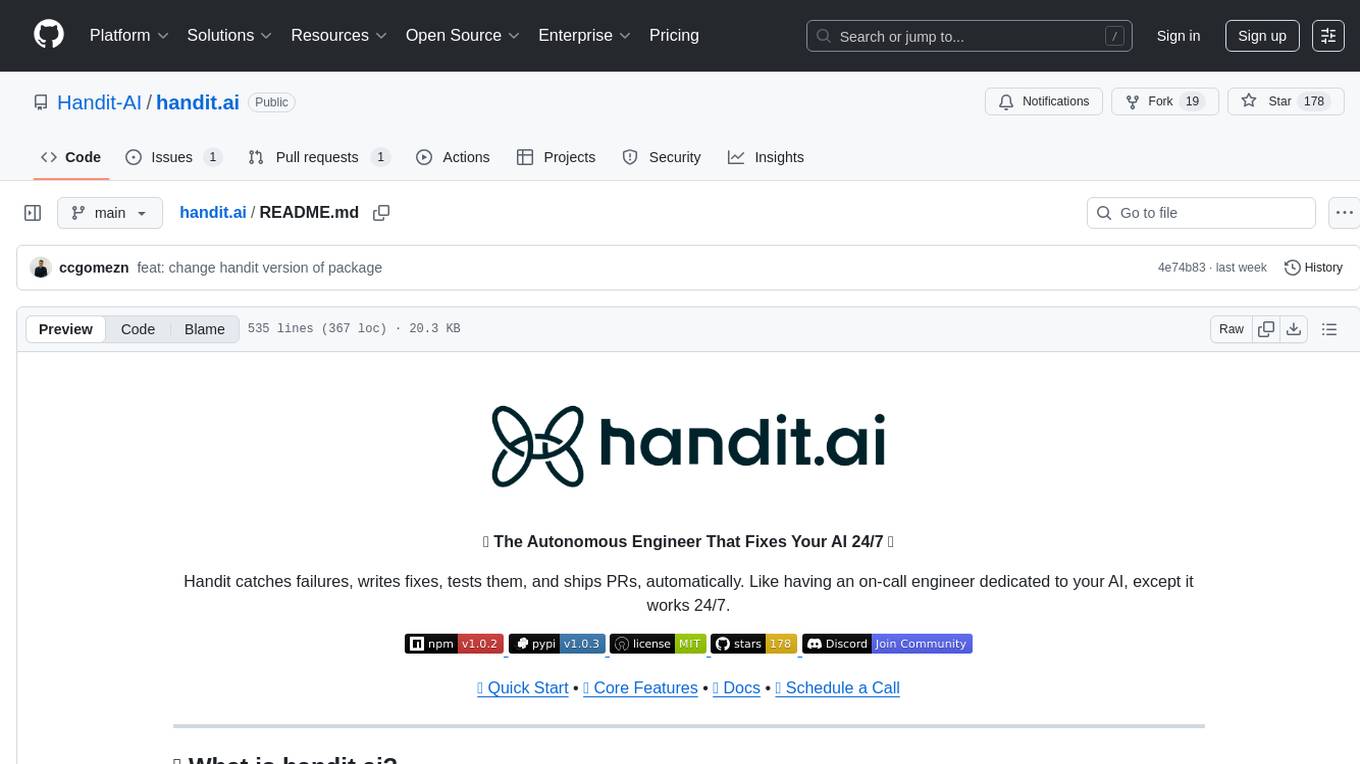
handit.ai
Handit.ai is an autonomous engineer tool designed to fix AI failures 24/7. It catches failures, writes fixes, tests them, and ships PRs automatically. It monitors AI applications, detects issues, generates fixes, tests them against real data, and ships them as pull requests—all automatically. Users can write JavaScript, TypeScript, Python, and more, and the tool automates what used to require manual debugging and firefighting.
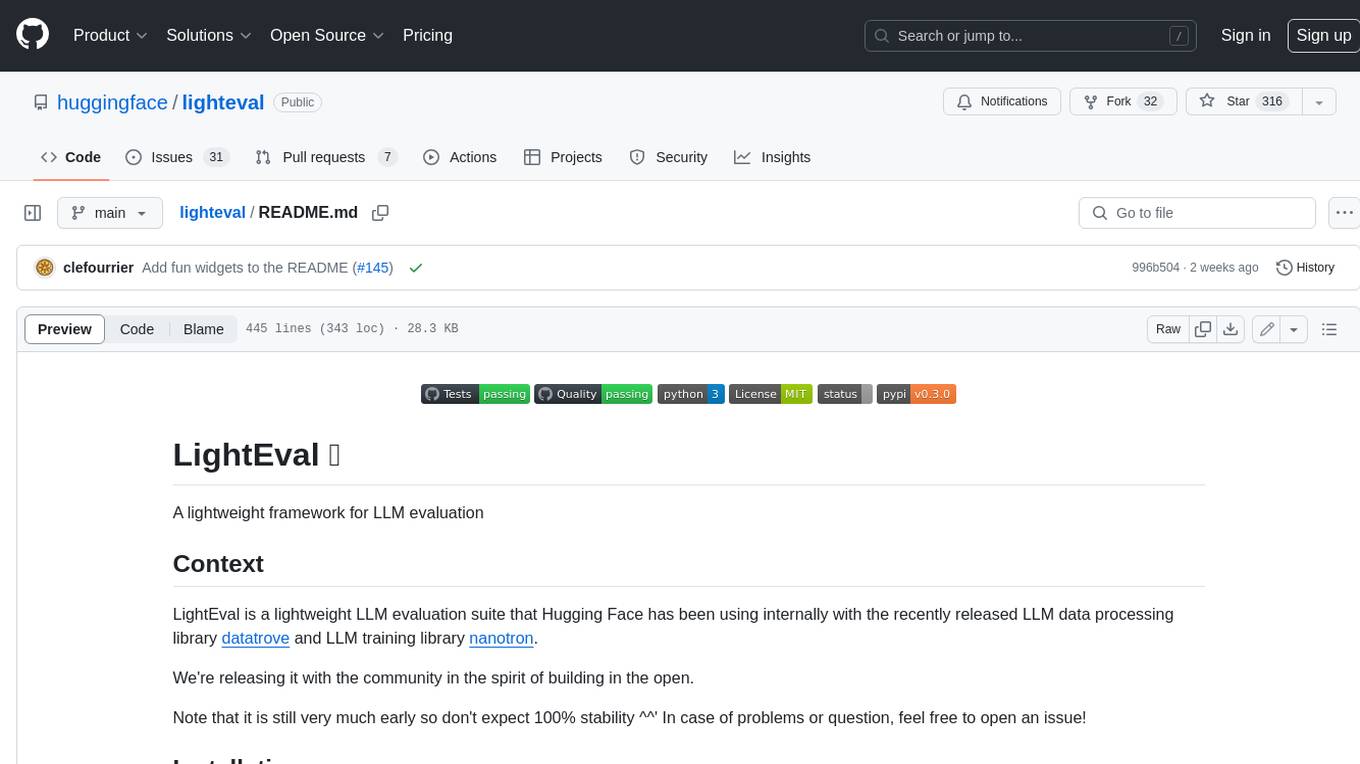
lighteval
LightEval is a lightweight LLM evaluation suite that Hugging Face has been using internally with the recently released LLM data processing library datatrove and LLM training library nanotron. We're releasing it with the community in the spirit of building in the open. Note that it is still very much early so don't expect 100% stability ^^' In case of problems or question, feel free to open an issue!
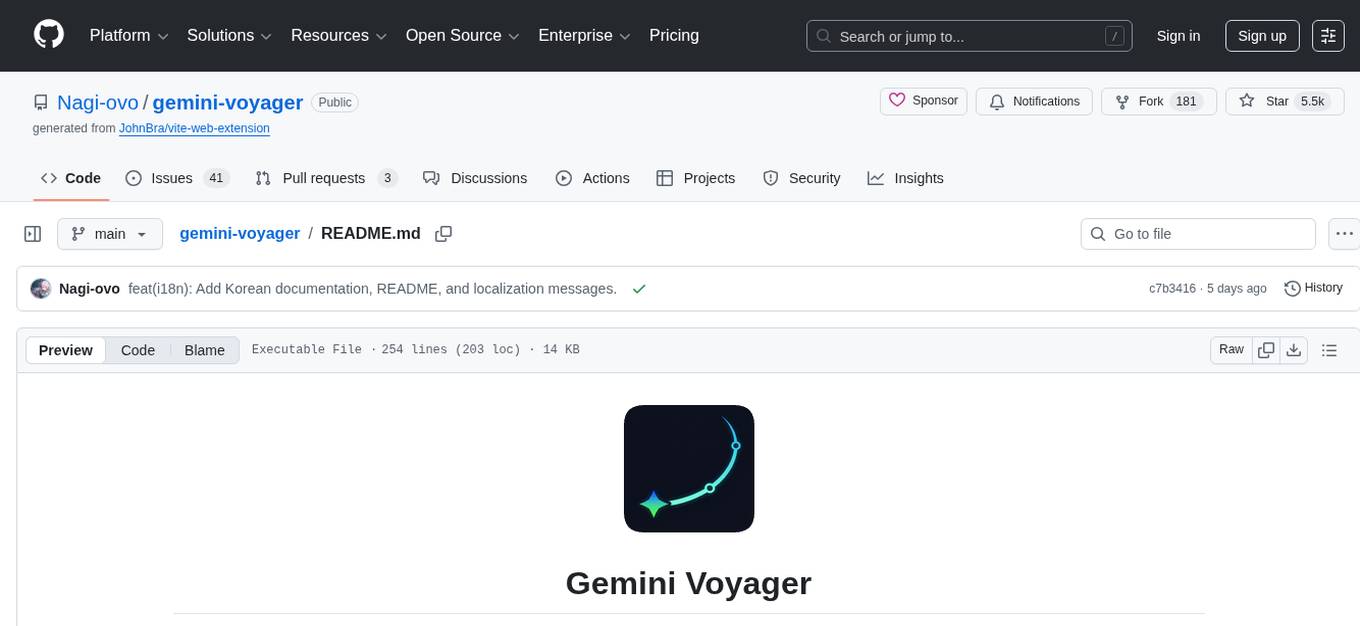
gemini-voyager
Gemini Voyager is a browser extension designed to enhance the user experience of Google Gemini by providing features such as folder organization, prompt vault, cloud sync, timeline navigation, chat export, Mermaid rendering, markdown fixing, and various power tools. It aims to help users keep their AI conversations organized, accessible, and productive. The extension is available on multiple browsers and supports manual installation and development builds. Users can also support the project by buying the developer a coffee or sponsoring via different platforms.
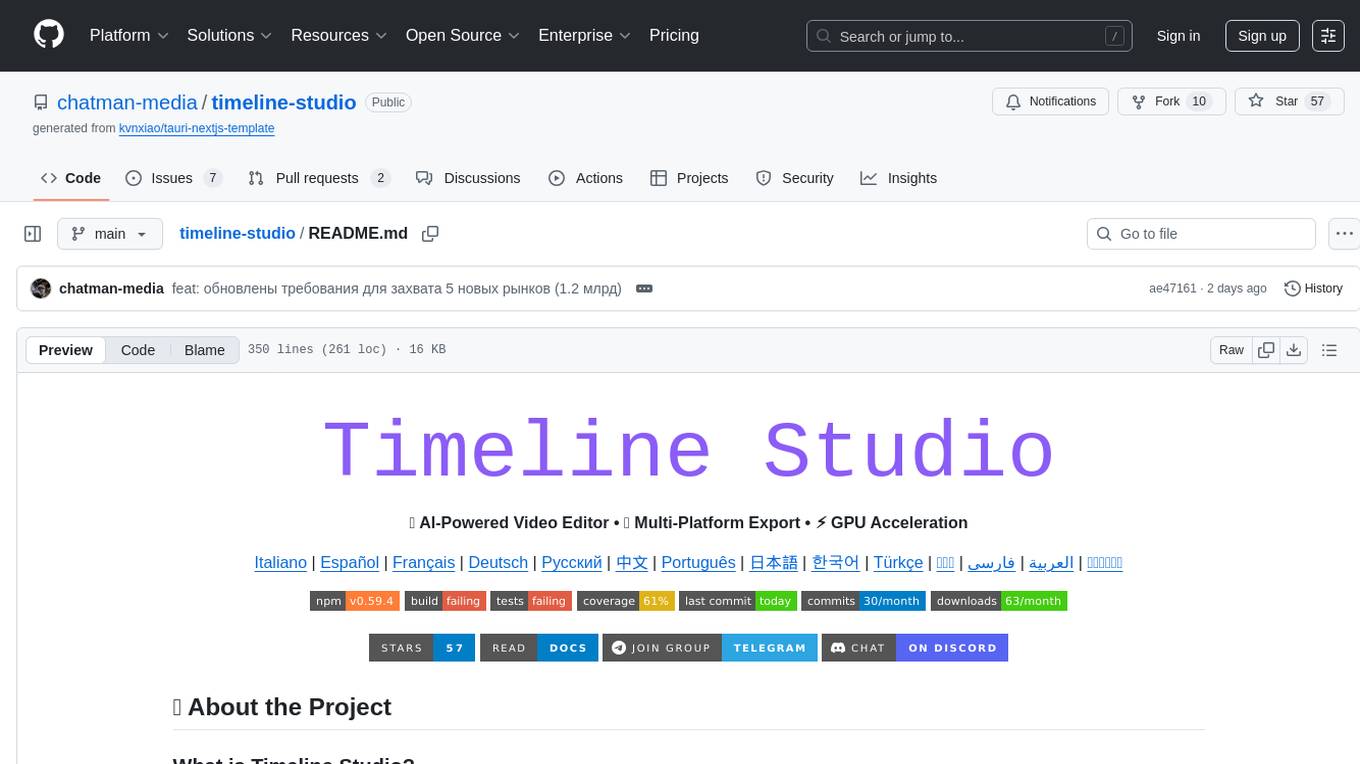
timeline-studio
Timeline Studio is a next-generation professional video editor with AI integration that automates content creation for social media. It combines the power of desktop applications with the convenience of web interfaces. With 257 AI tools, GPU acceleration, plugin system, multi-language interface, and local processing, Timeline Studio offers complete video production automation. Users can create videos for various social media platforms like TikTok, YouTube, Vimeo, Telegram, and Instagram with optimized versions. The tool saves time, understands trends, provides professional quality, and allows for easy feature extension through plugins. Timeline Studio is open source, transparent, and offers significant time savings and quality improvements for video editing tasks.
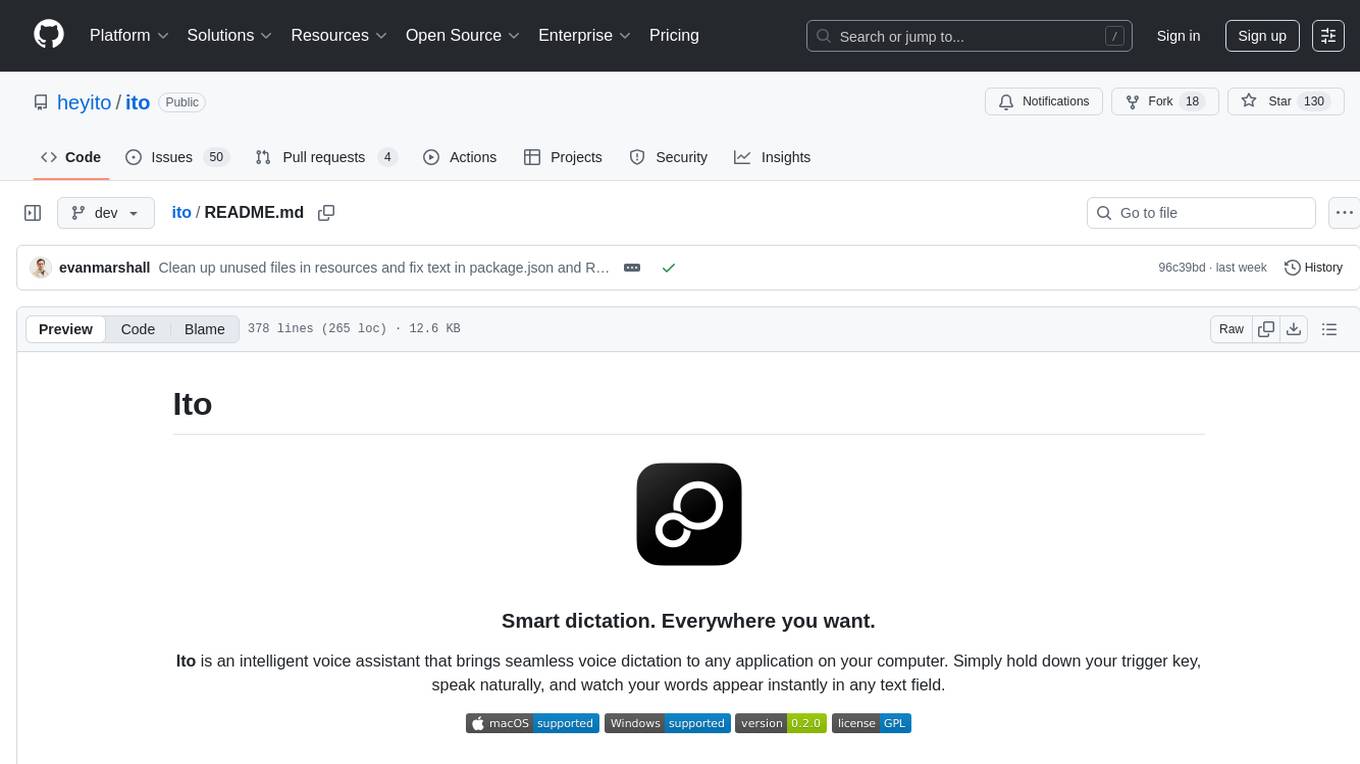
ito
Ito is an intelligent voice assistant that provides seamless voice dictation to any application on your computer. It works in any app, offers global keyboard shortcuts, real-time transcription, and instant text insertion. It is smart and adaptive with features like custom dictionary, context awareness, multi-language support, and intelligent punctuation. Users can customize trigger keys, audio preferences, and privacy controls. It also offers data management features like a notes system, interaction history, cloud sync, and export capabilities. Ito is built as a modern Electron application with a multi-process architecture and utilizes technologies like React, TypeScript, Rust, gRPC, and AWS CDK.
For similar tasks
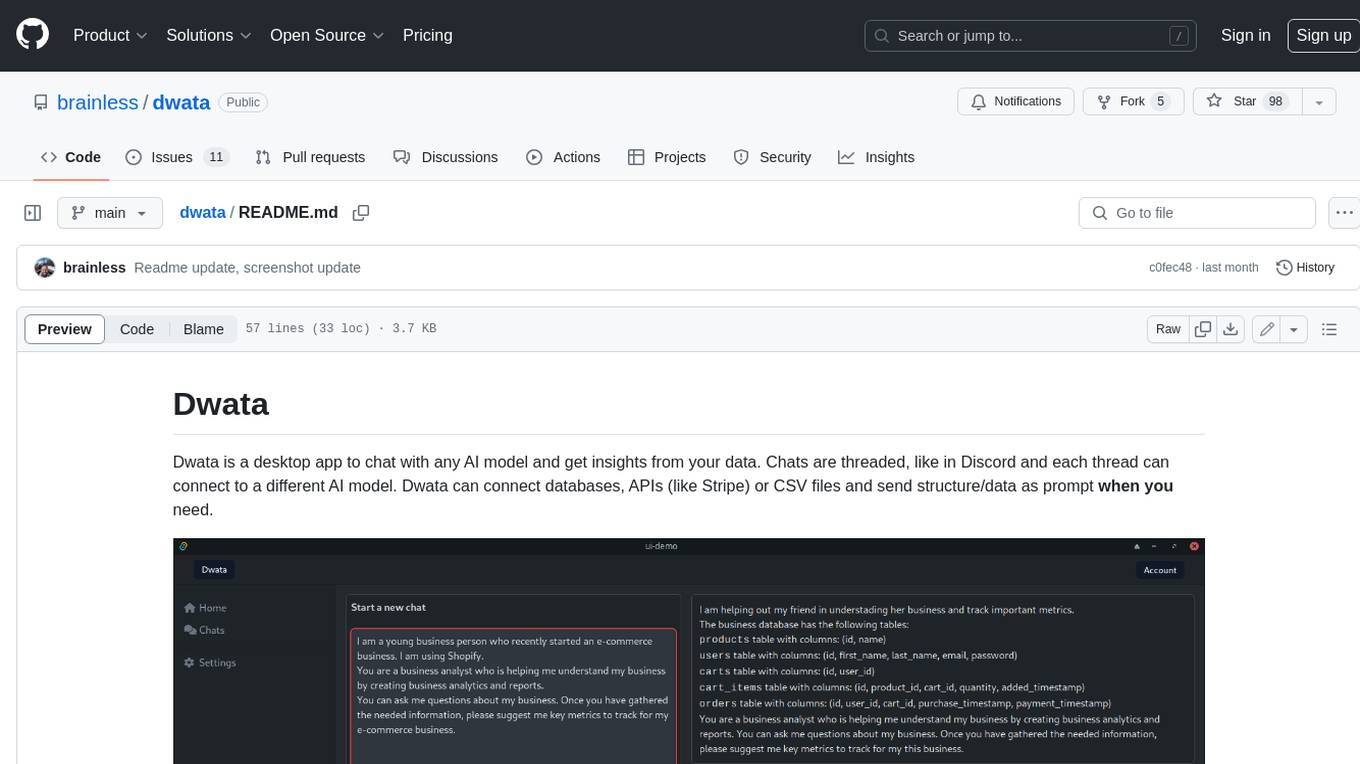
dwata
Dwata is a desktop application that allows users to chat with any AI model and gain insights from their data. Chats are organized into threads, similar to Discord, with each thread connecting to a different AI model. Dwata can connect to databases, APIs (such as Stripe), or CSV files and send structured data as prompts when needed. The AI's response will often include SQL or Python code, which can be used to extract the desired insights. Dwata can validate AI-generated SQL to ensure that the tables and columns referenced are correct and can execute queries against the database from within the application. Python code (typically using Pandas) can also be executed from within Dwata, although this feature is still in development. Dwata supports a range of AI models, including OpenAI's GPT-4, GPT-4 Turbo, and GPT-3.5 Turbo; Groq's LLaMA2-70b and Mixtral-8x7b; Phind's Phind-34B and Phind-70B; Anthropic's Claude; and Ollama's Llama 2, Mistral, and Phi-2 Gemma. Dwata can compare chats from different models, allowing users to see the responses of multiple models to the same prompts. Dwata can connect to various data sources, including databases (PostgreSQL, MySQL, MongoDB), SaaS products (Stripe, Shopify), CSV files/folders, and email (IMAP). The desktop application does not collect any private or business data without the user's explicit consent.
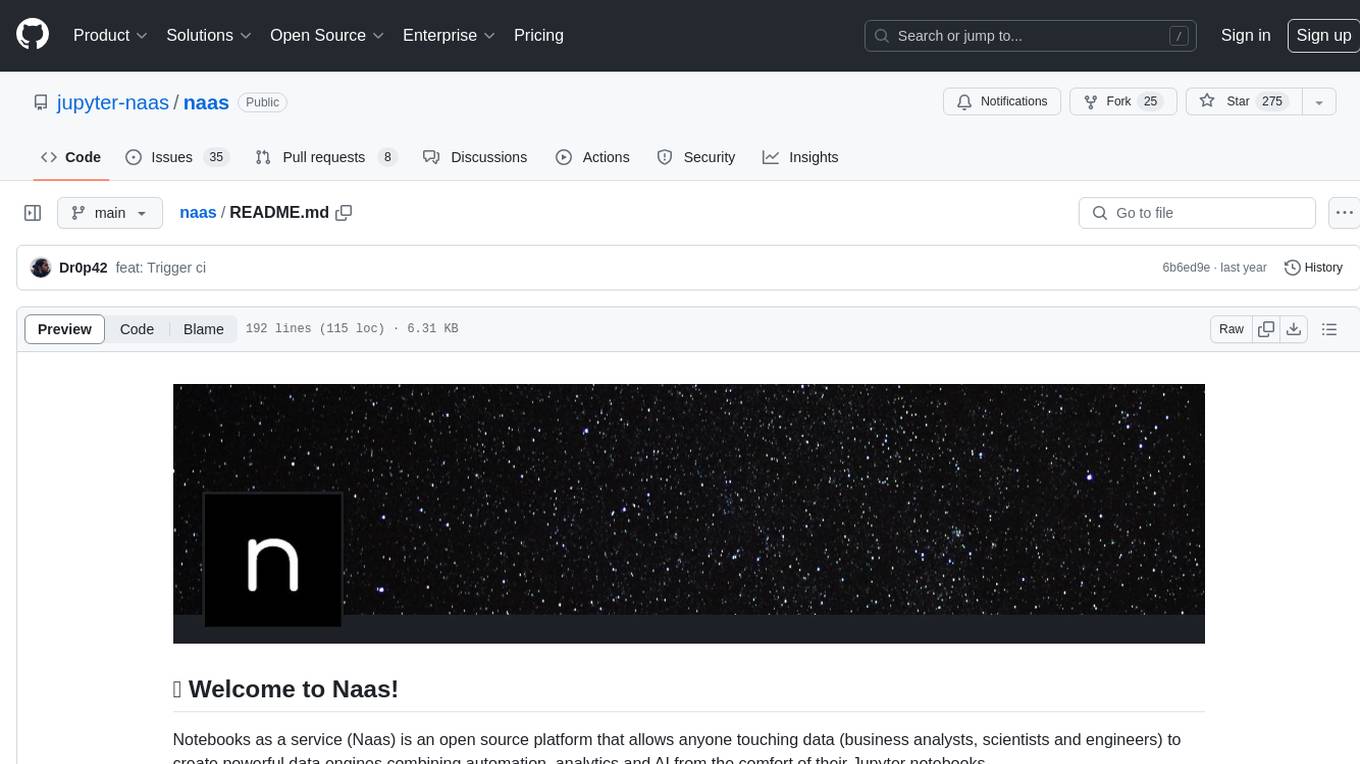
naas
Naas (Notebooks as a service) is an open source platform that enables users to create powerful data engines combining automation, analytics, and AI from Jupyter notebooks. It offers features like templates for automated data jobs and reports, drivers for data connectivity, and production-ready environment with scheduling and notifications. Naas aims to provide an alternative to Google Colab with enhanced low-code layers.

raggenie
RAGGENIE is a low-code RAG builder tool designed to simplify the creation of conversational AI applications. It offers out-of-the-box plugins for connecting to various data sources and building conversational AI on top of them, including integration with pre-built agents for actions. The tool is open-source under the MIT license, with a current focus on making it easy to build RAG applications and future plans for maintenance, monitoring, and transitioning applications from pilots to production.

letsql
LETSQL is a data processing library built on top of Ibis and DataFusion to write multi-engine data workflows. It is currently in development and does not have a stable release. Users can install LETSQL from PyPI and use it to connect to data sources, read data, filter, group, and aggregate data for analysis. Contributions to the project are welcome, and the library is actively maintained with support available for any issues. LETSQL heavily relies on Ibis and DataFusion for its functionality.
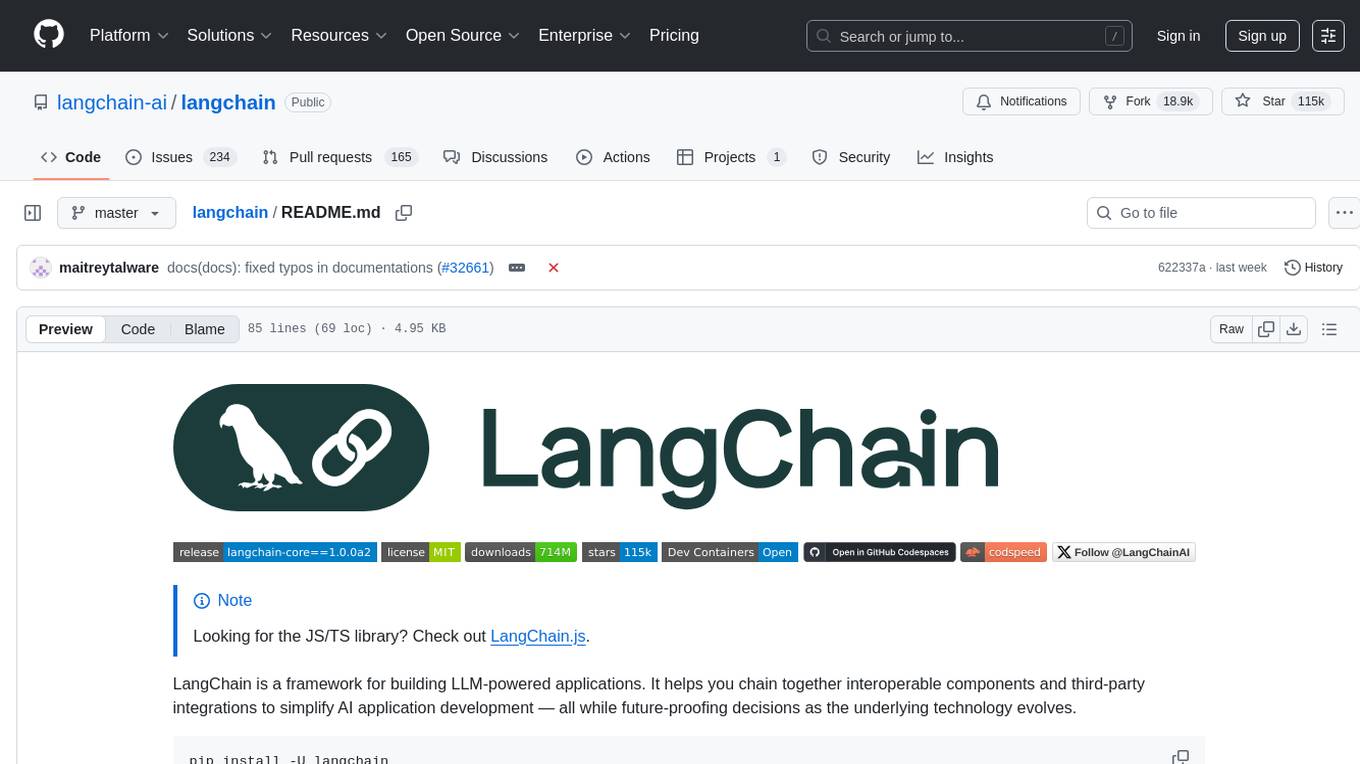
langchain
LangChain is a framework for building LLM-powered applications that simplifies AI application development by chaining together interoperable components and third-party integrations. It helps developers connect LLMs to diverse data sources, swap models easily, and future-proof decisions as technology evolves. LangChain's ecosystem includes tools like LangSmith for agent evals, LangGraph for complex task handling, and LangGraph Platform for deployment and scaling. Additional resources include tutorials, how-to guides, conceptual guides, a forum, API reference, and chat support.

mcp
Model Context Protocol (MCP) is an open protocol that standardizes how applications provide context to large language models (LLMs). It allows AI applications to connect with various data sources and tools in a consistent manner, enhancing their capabilities and flexibility. This repository contains core libraries, test frameworks, engineering systems, pipelines, and tooling for Microsoft MCP Server contributors to unify engineering investments and reduce duplication and divergence. For more details, visit the official MCP website.
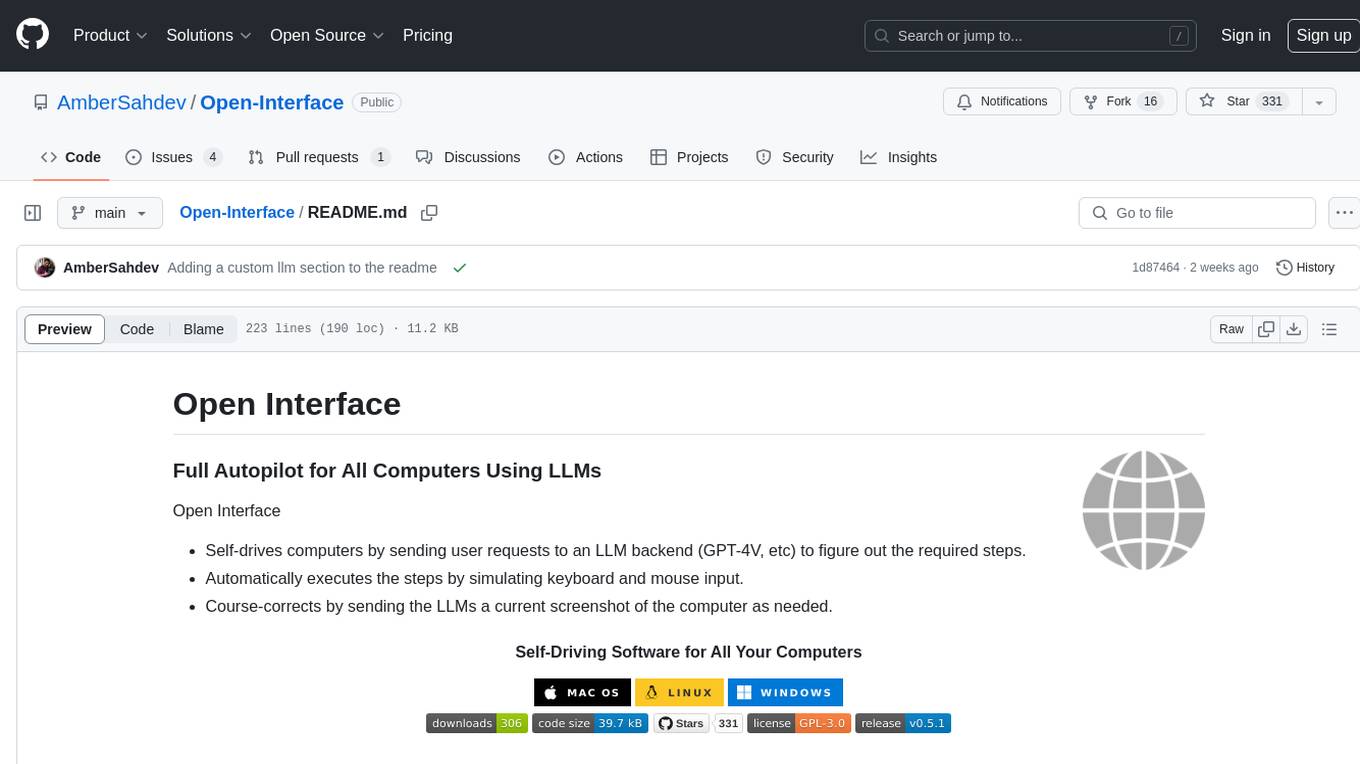
Open-Interface
Open Interface is a self-driving software that automates computer tasks by sending user requests to a language model backend (e.g., GPT-4V) and simulating keyboard and mouse inputs to execute the steps. It course-corrects by sending current screenshots to the language models. The tool supports MacOS, Linux, and Windows, and requires setting up the OpenAI API key for access to GPT-4V. It can automate tasks like creating meal plans, setting up custom language model backends, and more. Open Interface is currently not efficient in accurate spatial reasoning, tracking itself in tabular contexts, and navigating complex GUI-rich applications. Future improvements aim to enhance the tool's capabilities with better models trained on video walkthroughs. The tool is cost-effective, with user requests priced between $0.05 - $0.20, and offers features like interrupting the app and primary display visibility in multi-monitor setups.
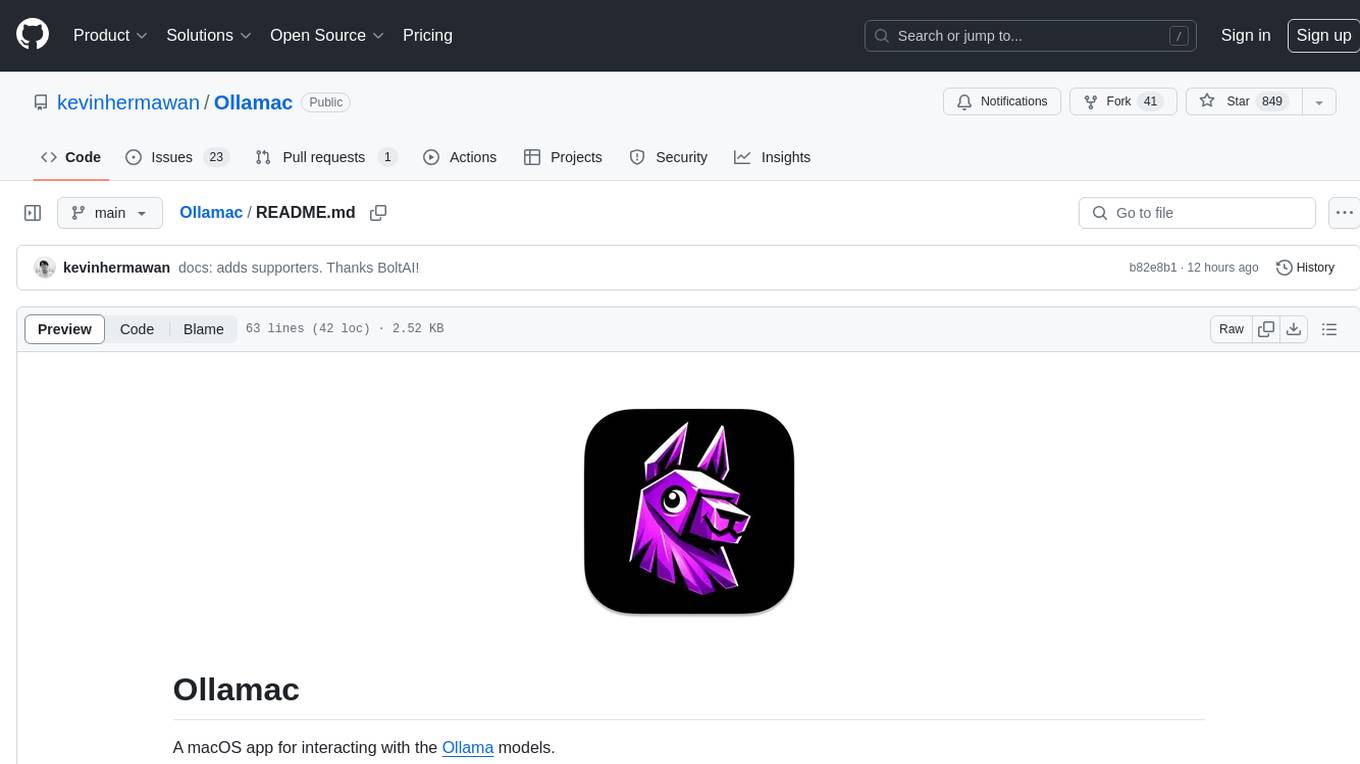
Ollamac
Ollamac is a macOS app designed for interacting with Ollama models. It is optimized for macOS, allowing users to easily use any model from the Ollama library. The app features a user-friendly interface, chat archive for saving interactions, and real-time communication using HTTP streaming technology. Ollamac is open-source, enabling users to contribute to its development and enhance its capabilities. It requires macOS 14 or later and the Ollama system to be installed on the user's Mac with at least one Ollama model downloaded.
For similar jobs

sweep
Sweep is an AI junior developer that turns bugs and feature requests into code changes. It automatically handles developer experience improvements like adding type hints and improving test coverage.

teams-ai
The Teams AI Library is a software development kit (SDK) that helps developers create bots that can interact with Teams and Microsoft 365 applications. It is built on top of the Bot Framework SDK and simplifies the process of developing bots that interact with Teams' artificial intelligence capabilities. The SDK is available for JavaScript/TypeScript, .NET, and Python.

ai-guide
This guide is dedicated to Large Language Models (LLMs) that you can run on your home computer. It assumes your PC is a lower-end, non-gaming setup.

classifai
Supercharge WordPress Content Workflows and Engagement with Artificial Intelligence. Tap into leading cloud-based services like OpenAI, Microsoft Azure AI, Google Gemini and IBM Watson to augment your WordPress-powered websites. Publish content faster while improving SEO performance and increasing audience engagement. ClassifAI integrates Artificial Intelligence and Machine Learning technologies to lighten your workload and eliminate tedious tasks, giving you more time to create original content that matters.

chatbot-ui
Chatbot UI is an open-source AI chat app that allows users to create and deploy their own AI chatbots. It is easy to use and can be customized to fit any need. Chatbot UI is perfect for businesses, developers, and anyone who wants to create a chatbot.

BricksLLM
BricksLLM is a cloud native AI gateway written in Go. Currently, it provides native support for OpenAI, Anthropic, Azure OpenAI and vLLM. BricksLLM aims to provide enterprise level infrastructure that can power any LLM production use cases. Here are some use cases for BricksLLM: * Set LLM usage limits for users on different pricing tiers * Track LLM usage on a per user and per organization basis * Block or redact requests containing PIIs * Improve LLM reliability with failovers, retries and caching * Distribute API keys with rate limits and cost limits for internal development/production use cases * Distribute API keys with rate limits and cost limits for students

uAgents
uAgents is a Python library developed by Fetch.ai that allows for the creation of autonomous AI agents. These agents can perform various tasks on a schedule or take action on various events. uAgents are easy to create and manage, and they are connected to a fast-growing network of other uAgents. They are also secure, with cryptographically secured messages and wallets.

griptape
Griptape is a modular Python framework for building AI-powered applications that securely connect to your enterprise data and APIs. It offers developers the ability to maintain control and flexibility at every step. Griptape's core components include Structures (Agents, Pipelines, and Workflows), Tasks, Tools, Memory (Conversation Memory, Task Memory, and Meta Memory), Drivers (Prompt and Embedding Drivers, Vector Store Drivers, Image Generation Drivers, Image Query Drivers, SQL Drivers, Web Scraper Drivers, and Conversation Memory Drivers), Engines (Query Engines, Extraction Engines, Summary Engines, Image Generation Engines, and Image Query Engines), and additional components (Rulesets, Loaders, Artifacts, Chunkers, and Tokenizers). Griptape enables developers to create AI-powered applications with ease and efficiency.






